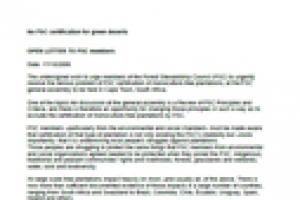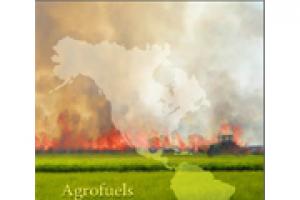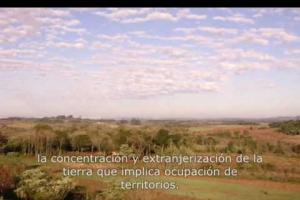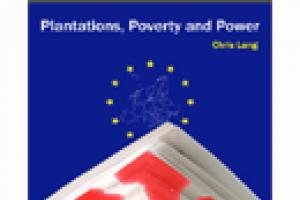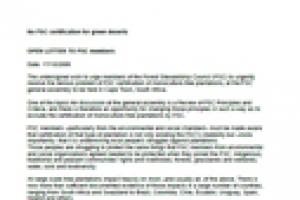By José Heder Benatti.
This paper is a preliminary legal reflection on the role of common property in the Brazilian Amazon. It suggests the integration of two distinct normative scopes of the society, the legal right and consuetudinary law, with the objective to argue that the legal instruments of the Brazilian society can be used to protect the cultural and natural patrimony.
America (general)
Other information
3 July 2010
Bulletin articles
29 June 2010
A group of Latin American social organizations (1) met in Montevideo to examine the Free Trade Agreements (FTAs) that the European Union (EU) signed last May with Central America, Colombia and Peru. Not only are these FTAs a serious threat to the food sovereignty of the peoples, the forests, the region’s main ecosystems and to artisan fisheries, but they will also worsen climate change.
Other information
29 November 2009
Edited by Richard Jonasse, PhD.
Institute for Food and Development Policy, 2009
Download as pdf
Other information
6 September 2009
Part 1
frameborder="0" width="640" height="480">
Part 2
Bulletin articles
30 August 2009
On 1 August 2009, members of the Latin American Network against Monoculture Tree Plantations (RECOMA) met in the locality of Villa Serrana, Uruguay, to examine the reasons for the alarming expansion of monoculture tree plantations aimed at the production of charcoal, pulp, timber and agrofuels (agrodiesel and ethanol derived from wood), mainly intended for export.
Bulletin articles
30 March 2009
Vast areas of land where diverse and rich ecosystems predominate are being replaced with large scale tree plantations in the South. These plantations –whether eucalyptus, pines, rubber, oil palm or other- are resulting in serious impacts on local communities, who see their ecosystems and livelihoods destroyed to make way to industrial tree plantations. Apart from affecting communities as a whole, they result in specific and differentiated impacts on women which translate in their disempowerment.
Publications
18 December 2008
By Chris Lang
Other information
21 July 2007
Only available in Spanish -
Por Pablo Cingolani - 21/Julio/2007
No a las mega represas de Lula en el río Madera
Bulletin articles
23 May 2007
The hegemony of the G8 in international forums such as the United Nations Framework Convention of Climate Change means that global climate policy is been chosen for its compatibility with the existing economic system rather than its effectiveness in reducing emissions.
Other information
30 March 2007
Miguel A Altieri, Professor of Agroecology, University of California, Berkeley
Elizabeth Bravo, Red por una América Latina Libre de Transgenicos, Quito, Ecuador
Publications
22 September 2006
Selection of articles published in the monthly electronic bulletin of the World Rainforest Movement, addressing the impacts of the oil palm plantations in the forestss.
Oil Palm. From Cosmetics to Biodiesel, Colonization Lives On
Bulletin articles
1 August 2006
In 2000, July 26th was first chosen as a day for the mangroves based on its great significance for the movement in Latin America led by Red Manglar (Mangrove Network). July 26th commemorates that day in 1998 when a Greenpeace activist from Micronesia, Hayhow Daniel Nanoto, died of a heart attack while involved in a massive protest action led by FUNDECOL and Greenpeace International. During this action the local community of Muisne joined the NGOs in dismantling an illegally built shrimp pond in an attempt to restore this damaged zone back to its former state as a mangrove forest.
